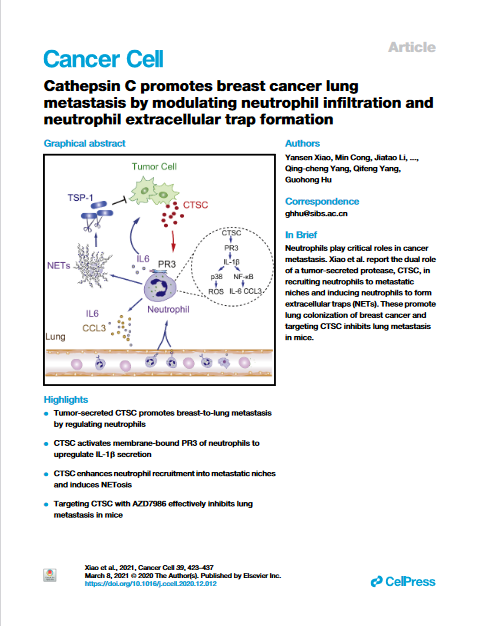03.12.2021
Cathepsin C promotes breast cancer lung metastasis by modulating neutrophil infiltration and neutrophil extracellular trap formation
Cancer Cell, 2021
Abstract
Lung metastasis is the major cause of breast cancer-related mortality. The neutrophil-associated inflammatory microenvironment aids tumor cells in metastatic colonization in lungs. Here, we show that tumor-secreted protease cathepsin C (CTSC) promotes breast-to-lung metastasis by regulating recruitment of neutrophils and formation of neutrophil extracellular traps (NETs). CTSC enzymatically activates neutrophil membrane-bound proteinase 3 (PR3) to facilitate interleukin-1β (IL-1β) processing and nuclear factor κB activation, thus upregulating IL-6 and CCL3 for neutrophil recruitment. In addition, the CTSC-PR3-IL-1β axis induces neutrophil reactive oxygen species production and formation of NETs, which degrade thrombospondin-1 and support metastatic growth of cancer cells in the lungs. CTSC expression and secretion are associated with NET formation and lung metastasis in human breast tumors. Importantly, targeting CTSC with compound AZD7986 effectively suppresses lung metastasis of breast cancer in a mouse model. Overall, our findings reveal a mechanism of how tumor cells regulate neutrophils in metastatic niches and support CTSC-targeting approaches for cancer treatment.
The following Bio X Cell antibodies were featured in this publication:
Anti-mouse IL-1b antibody (clone B122, Bio X Cell catalog no. BE0246)
Anti-mouse IL-6 antibody (clone MP5-20F3, Bio X Cell catalog no. BE0046)
Polyclonal Armenian hamster IgG Isotype Control (Bio X Cell catalog no. BE0091)
>> View article


